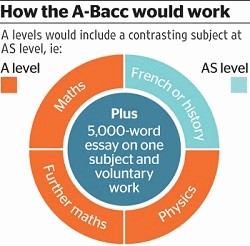

Michael Gove is planning an overhaul of A levels in the next stage of the biggest exam reorganisation for decades, The Times can reveal.
The Education Secretary is developing an Advanced Baccalaureate for which students would take a mix of A-level subjects, write a 5,000-word essay and undertake voluntary work. He is likely to scrap modular A levels, making them a two-year course with exams at the end. He will keep the AS level, but as a separate qualification.
The plans are being developed in quick succession to Mr Gove’s decision to scrap GCSEs in core subjects and replace them with tougher new exams, each overseen by one awarding body. It means that, within three years, the entire exam system for secondary schools will have been replaced or overhauled.
The A-Bacc would require A-level students to include a “contrasting” subject in their choice of courses, to counter criticism that the present system introduces too much subject specialism at 16.
A candidate who chose A levels in maths, further maths and physics, for example, would be expected to pick a humanity, such as history or French, as a fourth AS level. Similarly, a teenager who opted for humanities A levels such as English, history and ancient history would be required to take a maths course at AS level.
The plan is a response to complaints from universities that many new undergraduates lack skills in extended writing, research, analysis, critical thinking and problem solving.
Mr Gove also wants shorter and more open-ended questions in exams to move away from “sat-nav” A-level papers, which critics say have too many long questions that guide candidates towards the desired answer rather than inviting them to navigate themselves, drawing on their own knowledge of the subject.
One option being considered is to limit the A-Bacc to teenagers who choose at least two A levels from a list of subjects specified by Russell Group universities: maths, further maths, English literature, physics, biology, chemistry, geography, history, and modern and classical languages.
But this will risk renewed claims that Mr Gove is being too prescriptive in championing traditional subjects and limiting opportunity for teenagers with different interests and talents.
University vice-chancellors and admissions tutors want to keep the present system, in which candidates typically study four AS levels, with grades awarded after a year, and continue with three subjects for a final year, known as A2, which together comprise a full A level. AS-level grades are widely used by universities to select applicants for admissions offers.
However, Mr Gove has been lobbied by some academics who want him to restore traditional A levels with exams at the end of the course. They say that many undergraduates arrive at university unprepared for the intensity of study, especially in maths and physics, and claim that traditional A levels would allow more teaching time in schools.
The A-Bacc is based loosely on the International Baccalaureate diploma but seeks to keep the subject specialism of A levels.Candidates would have to research and write a 5,000-word essay or produce a detailed artwork or composition for the extended project. They would also undertake voluntary work or citizenship activity parallel to their academic studies, although details of how such community work should be certified are still being considered.
An Advanced Baccalaureate is a logical extension of the English Baccalaureate or E-Bacc, a combination of GCSEs designated by Mr Gove that includes English, maths, sciences, a language and history or geography. From 2015, GCSEs in core subjects will be replaced with new exams called the English Baccalaureate Certificate.
The E-Bacc has been controversial, with many teachers saying that it is too prescriptive and does not cater for teenagers with different academic strengths or who prefer a different approach.
Last month Ed Miliband, the Labour leader, said that his party would introduce a Technical Baccalaureate or “Tech Bacc” for students aged 18 who completed technical qualifications alongside GCSEs or replacement exams in English and maths, plus a programme of work experience.
Source: TimesOnline, October 17 2012
|

